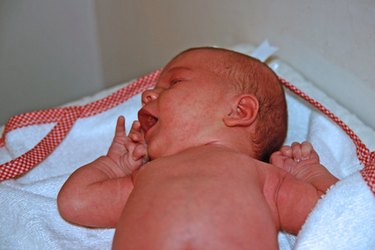
Tachycardia is the medical term for a very rapid heartbeat. Mothers who have special medical conditions, such as thyroid disease or diabetes, may give birth to newborns who are temporarily tachycardic from altered hormone and glucose levels. Because it may be a sign of a serious underlying condition, a very rapid heart rate in infants should always be evaluated by a physician.
Wolff-Parkinson-White Syndrome
Video of the Day
Some infants are born with accessory electrical tissue in the heart that causes episodes of rapid heart rate. A normal heart rate for infants is less than 150 beats per minute. The New York Times Health Guide states that Wolff-Parkinson-White syndrome is one of the most common causes of tachycardia in babies and children. Normally, electrical impulses in the heart are produced, conducted and regulated by a finite amount of specialized cells and tissues. In Wolff-Parkinson-White syndrome, there are extra cells and an accessory pathway, causing additional heartbeats that may nearly double the normal heart rate. Depending on the severity of the condition, episodes of tachycardia may be few or frequent. Diagnosis may be delayed if tachycardia does not occur during testing. An ECG may show an abnormality called a delta wave. Treatment options include medications or a procedure known as catheter ablation, which destroys the extra impulse-producing cells with radiofrequency.
Video of the Day
Medication Side Effects
Over-the-counter medications have not been proven to reduce children's symptoms of cough and cold, while serious adverse effects, including infant deaths, have been attributed to these remedies. An article published in the March 2002 "American Family Physician" states that tachycardia may be associated with several ingredients, including antihistamines such as chlorpheniramine and brompheniramine and decongestants such as pseudoephedrine, as well as the cough suppressant dextromethorphan. Rapid heart rate is also a common side effect of bronchodilator medications such as albuterol, epinephrine or salmeterol, which are used to relieve the symptoms of asthma or lung infections. These may be administered in breathing treatments. Caffeine and theophylline are stimulant drugs with similar side effects that may be prescribed for infant apnea, a condition which causes young babies to periodically stop breathing.
Dehydration
MayoClinic.com lists rapid heartbeat as a sign of dehydration. The loss of body fluids through poor feeding, excessive perspiration, vomiting or diarrhea can reduce blood volume, causing the heart to beat faster to maintain normal blood pressure. Dehydration is a common cause of infant death, especially in developing countries. If a baby cannot retain oral pediatric electrolyte solutions then rehydration with intravenous fluids is necessary.
Infection
A very rapid pulse rate may be a sign of a serious infection. KidsHealth advises that blood cultures are performed to diagnose the presence of bacterial or fungal organisms that have spread from an original site of infection to the bloodstream. Such infections typically cause tachycardia, fever, chills and an elevated white blood cell count. Diseases of this type include meningitis, endocarditis, osteomyelitis or cellulitis.